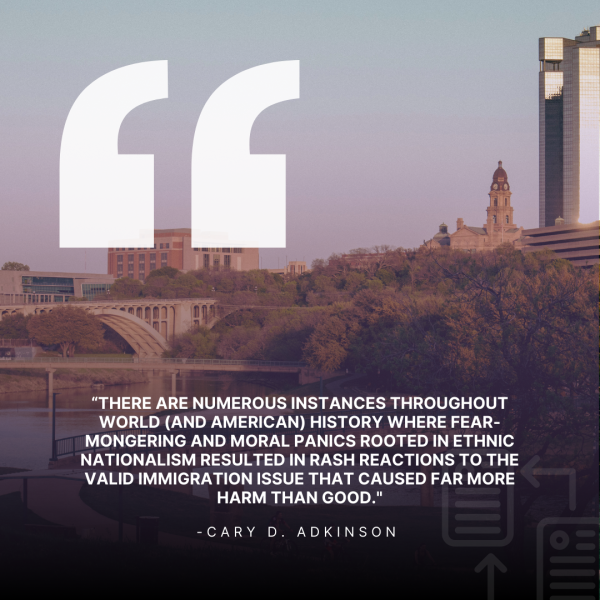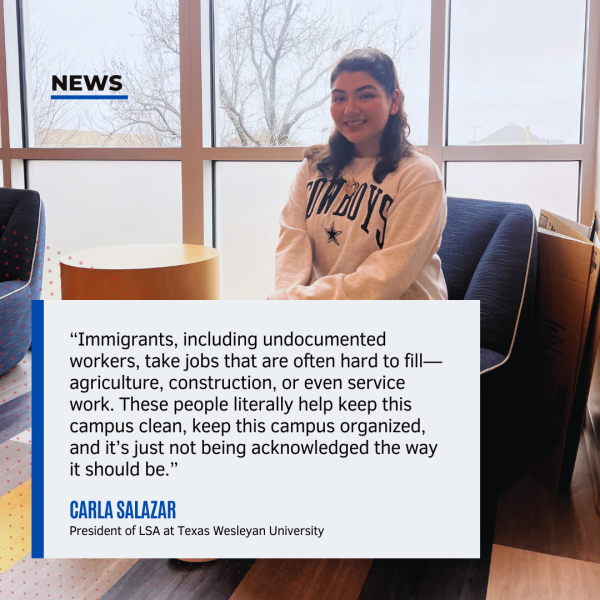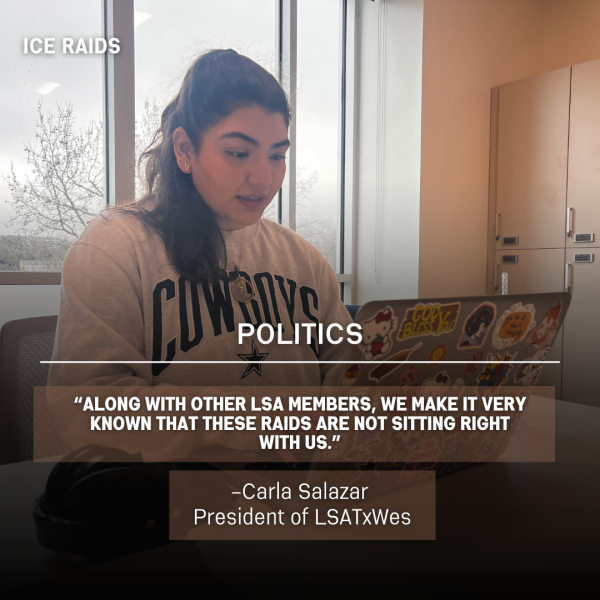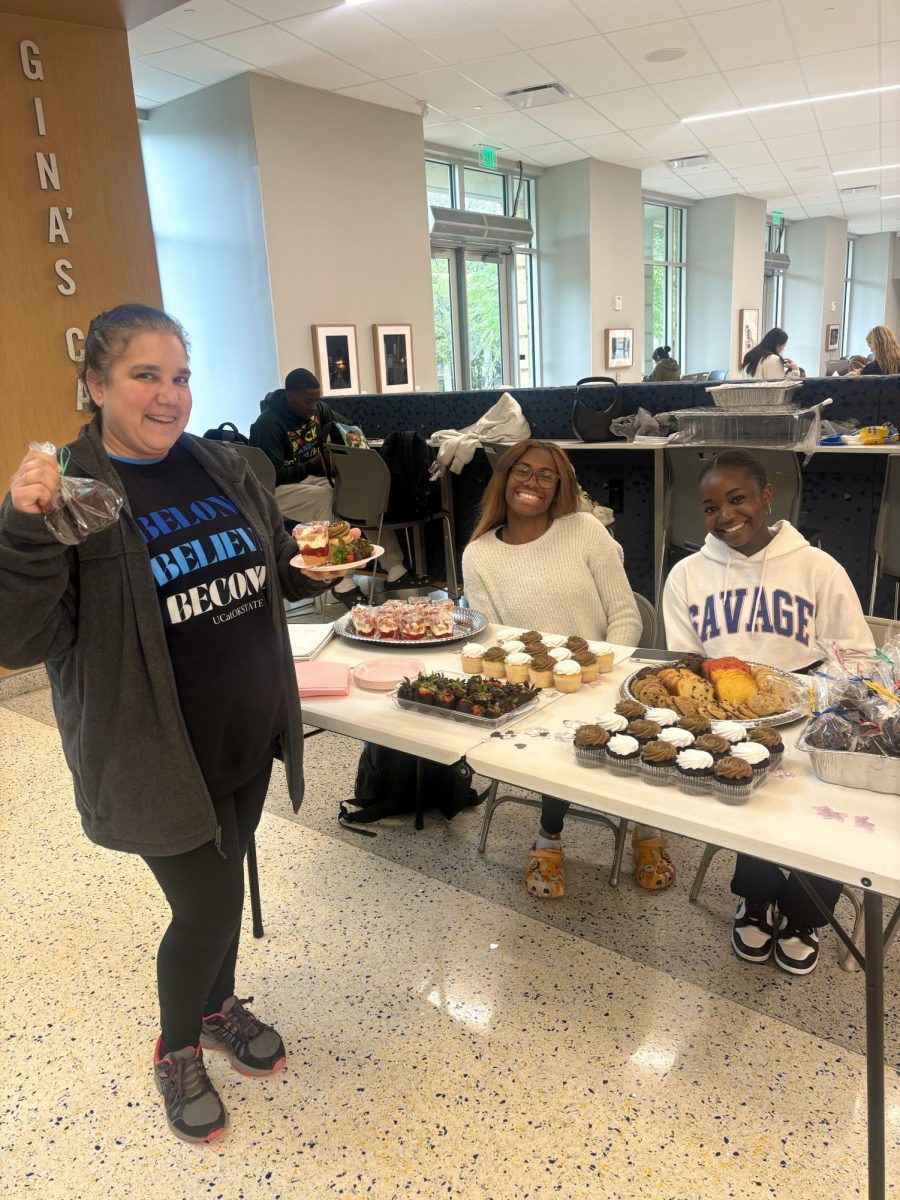The moral, legal and psychological impact of the recent raids by U.S. Immigration and Customs Enforcement (ICE) has affected many residents in North Texas, especially Fort Worth. These aggressive deportation practices have also created widespread fear and trepidation among some Texas Wesleyan University students.
“Protecting the American People Against Invasion,” the federal government’s policy issued in January 2025, intends to strengthen immigration enforcement. Dallas’s Fox 4 News reported on January 27th that ICE detained 84 undocumented people in the Dallas-Fort Worth area during a North Texas raid. Supporters of the executive order argue that it improves national security, while opponents point out that it disproportionately affects vulnerable groups and puts an unwarranted burden on their communities.
Dr. Cary Adkinson, associate professor of criminal justice at Texas Wesleyan, spoke about the moral consequences of ICE’s aggressive immigration enforcement.
“There are numerous instances throughout world [and American] history where fear-mongering and moral panics rooted in ethnic nationalism resulted in rash reactions to the valid immigration issue that caused far more harm than good,” Adkinson said.

Adkinson also raised concerns about the legal procedures involved with identifying migrants.
“There are due process considerations as well as the challenge of appropriately identifying those who have not been granted legal citizenship,” he said.
Adkinson pointed out the danger of “net widening,” in which documented U.S. citizens are detained through racial profiling and due process violations. He warned that “many non-criminal immigrants will be caught up in mass deportation,” and that the community’s diminished faith in the criminal justice system and law enforcement could have far-reaching effects.
“What is especially irresponsible is justifying this executive order on the basis of claims that many immigrants are ‘committing vile and heinous acts’ against innocent Americans without substantiating these claims with statistical evidence,” he said. “These are hardworking people who just want a better life for their families.”
Senior history major Cesar Espino, a Mexican American, talked about the psychological effects of the raids on immigrant communities.
“People do not understand the psychological impact these fearmongering tactics have on families,” he said.
Espino, a former intern of the League of United Latin American Citizens, explained that fear prevents workers from going to their jobs and immigrant parents from sending their children to school. He said this fear is worsened by policies that target typically safe places, like churches and schools.
“With new executive policies, schools and churches are no longer safe because they are a threat to raids,” Espino said. “This has led to Fort Worth’s own scandal where a right-wing conservative individual said that his school should be invaded because they [students] were not American enough.”
Espino also spoke about the underlying xenophobia and nationalism in recent immigration laws.
“If I read you the idea of Neo-fascism, which has to do with racial supremacy, we all would know about the Aryans, right-wing populism, nativism, xenophobia and anti-immigration sentiment,” Espino said. “I feel like we are seeing every single checkbox being checked.”
Espino said that these laws go against the concept of an “American Dream”, scaring longtime residents while failing to take action against dangerous criminals.
Espino added that despite the challenges, the Texas Wesleyan community has made efforts to support those affected.
“I have seen that Latinx Student Association plans on doing a Know Your Rights Workshop, which is crucial for the next generation of students to stand up for those who cannot,” he said.
The Latinx Student Association (LSA) president, Senior mass communication major Carla Salazar, said that as the daughter of an immigrant, she had a personal connection to this issue.
“I full-on understand the stress and anxiety that comes with it,” she said.
She described the threat of deportation and ICE operations as affecting entire communities, leading to social withdrawal, anxiety and economic hardships. Salazar has helped families and students without documentation by compiling and sharing resources such as a Linktree site.
“We put together a Linktree, where we have resources posted for those who are undocumented: [know] your rights kits, where if ICE were to come to your door, you know, based on what your [rights] are, what to say to them,” she said.
Salazar has also been vocal in opposing those policies.
“Along with other LSA members, we make it known that these raids are not sitting right with us,” she said.
Salazar also supports peaceful protest as a means of bringing about change.
“We are a small campus, but we still do have power,” she said. “Engage in peaceful activism, whether it be wearing a shirt or promoting petitions, or even contacting local representatives.”
Projects such as these and others help to raise awareness among the general population about misinformation and the ill effects of the current immigration policy.

Salazar added that there are many misperceptions about immigrants, and what should be highlighted are their contributions to the workforce, including at Texas Wesleyan.
“Immigrants, including undocumented workers, take jobs that are often hard to fill—agriculture, construction, or even service work,” she said. “These people literally help keep this campus clean, keep this campus organized, and it’s just not being acknowledged the way it should be.”
The federal government is continuing its deportation efforts, but activists like Salazar and Espino are continuing their countermeasures as well, staying both involved and vocal.
For those seeking further information and resources about immigration rights and safety, the LSA will host a ‘Know Your Rights Workshop’ on March 6.









![Pippin, played by Hunter Heart, leads a musical number in the second act of the musical. [Photo courtesy Kris Ikejiri]](https://therambler.org/wp-content/uploads/2025/04/Pippin-Review-1200x800.jpg)
![Harriet and Warren, played by Trinity Chenault and Trent Cole, embrace in a hug [Photo courtesy Lauren Hunt]](https://therambler.org/wp-content/uploads/2025/02/lettersfromthelibrary_01-1200x800.jpg)
![Samantha Barragan celebrates following victory in a bout. [Photo courtesy Tu Pha]](https://therambler.org/wp-content/uploads/2025/05/20250504_164435000_iOS-834x1200.jpg)





![Hunter Heart (center), the play's lead, rehearses a scene alongside other student actors. [Photo courtesy Jacob Sanchez]](https://therambler.org/wp-content/uploads/2025/04/thumbnail_IMG_8412-1200x816.jpg)
![Student actors rehearse for Pippin, Theatre Wesleyan's upcoming musical. [Photo courtesy Jacob Rivera-Sanchez]](https://therambler.org/wp-content/uploads/2025/04/Pippin-Preview-1200x739.jpg)
![[Photo courtesy Brooklyn Rowe]](https://therambler.org/wp-content/uploads/2025/05/CMYK_Shaiza_4227-1080x1200.jpg)

![Lady Rams softball wraps up weekend against Nelson Lions with a victory [6 – 1]](https://therambler.org/wp-content/uploads/2025/04/Screenshot-2025-04-04-100924-1200x647.png)

















![Rambler staff pose following the Texas Intercollegiate Press Association Convention award breakfast. [Photo courtesy Dr. Jenny Dean]](https://therambler.org/wp-content/uploads/2025/04/IMG_2646-1200x900.jpeg)